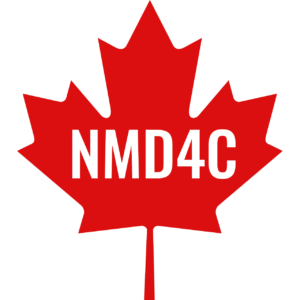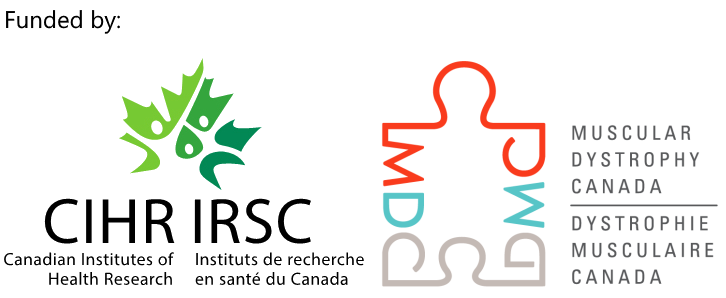Cynthia Gagnon

Investigator
Professor, Rehabilitation, Université de Sherbrooke; Researcher, FRQS Centre de recherche du CRCHUS
Visiting Professor, uOttawa and CHEO-RI
NMD4C Involvement: Pillar 2: Clinical Research, Pillar 3: Clinical Practice Research, Theme 5: Open Science
Email CynthiaBiography
Cynthia is a senior career-award researcher specializing in adult genetic neuromuscular disorders. She holds a professorial appointment at the School of Rehabilitation at the University of Sherbrooke. She is the scientific director of the Groupe de recherche interdisciplinaire sur les maladies neuromusculaires (GRIMN) and is a researcher at the Centre de recherche Charles-Le Moyne-Saguenay-Lac-St-Jean sur les innovations en santé.
Cynthia trained as an occupational therapist at McGill University. She has a doctoral degree in experimental medicine from Laval University and pursued a postdoctoral fellowship in program evaluation at Montreal University. Her work aims at improving clinical care and speeding up trial readiness in the most prevalent neuromuscular diseases in Canada. Her main interest is to document the natural history of the disease through an interdisciplinary perspective to be able to document the progression of the disease and to identify significant predictor and explanatory factors related to participation in daily activities and social roles of patients such as work and autonomous living. Her other interest is to define the best outcome measures to assess potential therapeutic targets such as muscle strength, fatigue or cognitive functions. She also works on developing knowledge translation strategies related to rare diseases to ensure effective and just-in-time knowledge translation to the interdisciplinary team through different strategies including wiki, articles, clinical practice guidelines to improve clinical care for patients and their families.
She is involved in several international projects in relation to myotonic dystrophy type 1 (DM1), oculopharyngeal muscular dystrophy (OPMD) and autosomal recessive spastic ataxia of Charlevoix-Saguenay (ARSACS).
Within NMD4C, Cynthia is lead for knowledge translation.
Recent Publications
Muslemani, S, Brisson, JD, Côté, I, Lessard, I, Côté, C, Brais, B et al.. Social Participation Restrictions and Explanatory Factors in Adults with Oculopharyngeal Muscular Dystrophy. Can J Occup Ther. 2024. 84174241255472 PMID:39285696
Roussel, MP, Ravel-Chapuis, A, Gobin, J, Jasmin, BJ, Leduc-Gaudet, JP, Gagnon, C et al.. Changes in Physiopathological Markers in Myotonic Dystrophy Type 1 Skeletal Muscle: A 3-Year Follow-up Study. J Neuromuscul Dis. 2024.11 (5)981-995 PMID:39031377
Beichert, L, Ilg, W, Kessler, C, Traschütz, A, Reich, S, Santorelli, FM et al.. Digital Gait Outcomes for Autosomal Recessive Spastic Ataxia of Charlevoix-Saguenay (ARSACS): Discriminative, Convergent, and Ecological Validity in a Multicenter Study (PROSPAX). Mov Disord. 2024. PMID:38847438
Girard-Côté, L, Gallais, B, Gagnon, C, Roussel, MP, Morin, M, Hébert, LJ et al.. Resistance training in women with myotonic dystrophy type 1: a multisystemic therapeutic avenue. Neuromuscul Disord. 2024.40 38-51 PMID:38824906
Mahdavi, M, Prévost, K, Balthazar, P, Hus, IF, Duchesne, É, Dumont, N et al.. Disturbance of the human gut microbiota in patients with Myotonic Dystrophy type 1. Comput Struct Biotechnol J. 2024.23 2097-2108 PMID:38803516
See more on PubMed
